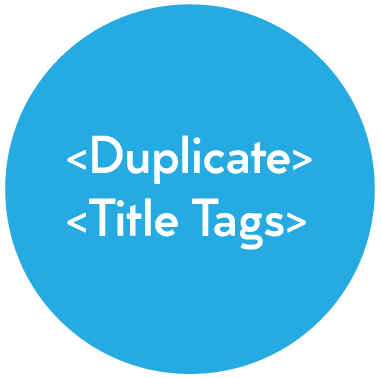Duplicate Title Tags SEO
Duplicate title tags in SEO refer to the situation where multiple pages on a website have the same title tag. The title tag is an HTML element that specifies the title of a webpage and is displayed in search engine results as the clickable headline for a given search result. It’s a critical on-page SEO element because it provides both search engines and users with a brief description of what the page is about.
It is critical that your title tags be optimized for both the search engines and the users visiting your website. With this in mind, you should make sure that your title tag contains your primary keyword phrase. The title tag is a ranking factor in the Google algorithm, so be sure to include it at the beginning of your title tag.


Duplicate Title Tag Problems
Having duplicate title tags can lead to various problems from an SEO perspective. Some of the most prominent problems include:
Keyword Confusion
Each page’s title tag should be unique and accurately reflect the content of that specific page. When multiple pages share the same title tag, it can confuse search engines about the content of those pages and potentially hurt the website’s rankings for targeted keywords.
Duplicate title tags in SEO can lead to significant problems, particularly related to keyword confusion. When multiple pages share the same title tag, search engines like Google can struggle to accurately understand the content and purpose of each page. As a result, several challenges can arise.
First and foremost, search engines might find it challenging to determine which page should rank higher for specific keywords, leading to competition between pages and ultimately reducing the website’s visibility in search results.
Secondly, the ability of each page to effectively target its intended keywords is hindered, impacting the optimization efforts. Moreover, users rely on title tags to assess the relevance of search results quickly.
However, with duplicate title tags, users may find it difficult to distinguish between pages, affecting the overall user experience and click-through rates. Additionally, in paid search advertising campaigns like Google Ads, Quality Scores play a crucial role in ad costs and placement, and duplicate title tags can lower these scores by diminishing landing page relevance.
Lastly, proper indexing can also be compromised, potentially resulting in some pages not being appropriately included in search results. To counter these challenges, it’s imperative to craft distinct and accurate title tags for each page, enabling search engines to better understand content, enhance keyword targeting, improve user experience, and elevate overall SEO performance.
Reduced Click-Through Rates (CTR)
Unique and compelling title tags can improve click-through rates (CTR) in search engine results. Duplicate title tags can make search results less appealing to users, as they may not differentiate between different pages with the same titles.
Low click-through rates (CTRs) present a significant challenge in terms of effective SEO. CTRs, which measure the proportion of users who click on a search result after seeing it, are a crucial metric indicating the relevance and attractiveness of a webpage’s content to users.
When CTRs are low, it suggests that the title tag and meta description displayed in search results fail to capture users’ attention or accurately convey the value of the page. This can have cascading effects on SEO performance: low CTRs signal to search engines that the page might not be providing the expected value, potentially leading to lower rankings over time.
Additionally, a low CTR reduces the amount of organic traffic a page receives, limiting its exposure and hindering its potential to engage users and achieve its intended goals. To combat low CTRs, it’s crucial to craft compelling and relevant title tags that accurately reflect the content and value of the page, thus enticing users to click and improving the page’s overall SEO performance.


Canonicalization Issues
Duplicate title tags might indicate a larger problem with duplicate content on your website. Search engines may have trouble determining the most relevant version of a page to show in search results, leading to indexing issues.
Canonicalization involves guiding search engines toward the preferred version of a webpage when there exist multiple versions accessible through distinct URLs. When several pages share identical title tags, search engines can encounter difficulty in discerning which version holds the most relevance and authority.
This confusion during the indexing process can result in several complications. First, search engines might mistakenly index an inappropriate version or prioritize one version over others, potentially leading to certain versions being excluded from search results.
Secondly, as search engines frown upon duplicate content due to its potential negative impact on user experience, the presence of duplicate title tags might signal duplicate content, inviting penalties or reduced rankings.
Moreover, the effort search engines expend on determining the correct version to index could lead to less efficient crawling and delayed indexing of other valuable pages.
Last but not least, different versions of the same content might receive disparate rankings based on the search engine’s interpretation, causing inconsistency in ranking positions for content with equivalent substance but differing URLs.
To counter these canonicalization challenges, it’s imperative to ensure that each page boasts a distinctive title tag. Additionally, the appropriate use of canonical tags on pages featuring similar or duplicated content is pivotal.
By addressing duplicate title tags and implementing canonical tags adeptly, you enable search engines to comprehend the principal rendition of your content, thereby amplifying your website’s holistic SEO performance.
Missed Opportunity for Optimization
Duplicate title tags represent a missed opportunity for optimization within the context of SEO. The title tag serves as a concise yet impactful representation of a webpage’s content and purpose, playing a pivotal role in conveying its relevance to both search engines and users.
When multiple pages share the same title tag, the chance to tailor each tag to its specific content and intended audience is squandered. This neglect diminishes the ability to strategically incorporate relevant keywords, phrases, and information that could enhance the page’s visibility in search results.
A unique and optimized title tag not only aids search engines in comprehending the content’s context but also entices users to click through, as it offers a clear depiction of what the page offers. By overlooking the opportunity to customize title tags, the potential to attract organic traffic, improve click-through rates, and elevate the overall SEO performance of each page is undermined.
Crafting distinct and targeted title tags can maximize the impact of each page in search rankings and drive user engagement, contributing significantly to an effective optimization strategy.
Just remember, every title tag is an opportunity to include relevant keywords and convey the page’s purpose. Duplicate title tags can result in missed opportunities for optimizing each page’s content for its target audience.


Ranking Challenges
Duplicate title tags present notable ranking challenges within the realm of SEO. Title tags are pivotal signals for search engines to comprehend a webpage’s content and relevance to specific search queries.
When multiple pages share the same title tag, search engines encounter difficulty discerning the distinctiveness and significance of each page’s content. This ambiguity can lead to confusion in ranking determination, potentially causing search engines to prioritize one page over others or even omit certain pages from consideration altogether.
Consequently, ranking positions might become inconsistent or diluted due to the inability to accurately differentiate the content’s value across various pages.
Additionally, when search engines face this uncertainty, they may not assign appropriate rankings to each page based on their individual merits, impacting the visibility and discoverability of the affected pages. As a result, a strategy that neglects the creation of unique title tags can hinder a website’s ability to secure optimal rankings and undermine its overall SEO performance.
When search engines encounter multiple pages with the same title tag, they might prioritize one page over the others, potentially causing ranking issues for the affected pages.
To avoid these problems, it’s important to ensure that each page on your website has a unique and descriptive title tag.
Duplicate Title Tags Best Practices
Now that you understand the drawbacks of having duplicate title tags on your website, it’s time to take action. Keep the following best practices in mind when crafting your unique and appealing title tags.
Create Unique Titles
Craft unique and descriptive title tags for each page that accurately reflect its content and purpose. Each title tag serves as a concise representation of a webpage’s content, aiding search engines in understanding its relevance and keywords.
Unique title tags prevent keyword confusion, enabling accurate indexing and ranking of pages. They enhance click-through rates by offering clear, appealing descriptions in search results, improving user engagement.
Also, distinct title tags optimize each page’s visibility, prevent duplicate content issues, and align with best practices, bolstering the website’s overall search engine performance.
Use Relevant Keywords
Incorporating relevant keywords in title tags is vital for SEO. Title tags are prime real estate for search engines to grasp a webpage’s subject. Relevant keywords optimize visibility in search results, enhancing the likelihood of matching user queries.
Keywords in title tags enhance click-through rates by offering concise, informative previews of content. They also boost search engines’ understanding of a page’s context, aiding accurate indexing and ranking.
By aligning title tags with users’ search intents, websites can effectively attract organic traffic, improve user experience, and enhance overall SEO performance.
Incorporate relevant keywords naturally into your title tags to improve the page’s visibility for those keywords in search results.
Avoid Boilerplate Titles
Steering clear of boilerplate title tags is critical for effective SEO.
Boilerplate titles lack uniqueness and specificity, hindering search engines’ ability to differentiate pages.
Customized title tags, on the other hand, accurately convey each page’s content, optimizing search engine comprehension and ranking precision.
Avoiding boilerplate titles also enhances user experience by offering informative, relevant previews in search results, encouraging higher click-through rates. Unique titles align with best practices, reducing the risk of duplicate content issues and promoting overall search visibility, resulting in improved website performance in search engine rankings.
Avoid using generic or boilerplate titles across multiple pages. Each page should have a distinct focus, and the title should reflect that.
Regularly Audit Your Website
Regular web page audits are vital for preventing duplicate title tags. Audits help identify instances where multiple pages share identical titles, ensuring each page has a unique and descriptive title tag.
By addressing duplicate titles promptly, the risk of keyword confusion is minimized, enhancing search engine understanding and user experience.
Audits also identify potential canonicalization issues and content duplication, allowing timely corrective actions. Consistent audits promote SEO health, prevent ranking challenges, and maintain accurate indexing, ultimately preserving a website’s credibility, search visibility, and overall performance.
Perform regular SEO audits to identify any instances of duplicate title tags or duplicate content, and take steps to resolve them.
